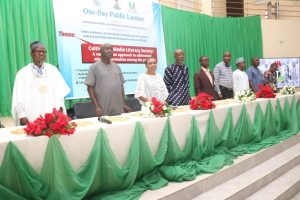Stakeholders, including the Media and Information Literacy &Intercultural Dialogue Foundation (MILID Foundation), the Federal Ministry of Information and National Orientation, UNESCO, National Open University of Nigeria (NOUN) and the International Media & Information Literacy Institute have joined forces to promote MIL among young people.
With the evolution in the information landscape and the rise of artificial intelligence (AI) especially Generative AI (GenAI), media and information literacy has become a necessity for all users and consumers of media and information, especially young people.
This was the thrust of a one-day public lecture held on Tuesday at the NOUN headquarters in Abuja jointly organised by the Media and Information Literacy &Intercultural Dialogue Foundation (MILID Foundation), the Federal Ministry of Information and National Orientation, UNESCO, the International Media and Information Institute (IMILI), and the National Open University of Nigeria (NOUN).
Mis/disinformation, hate speech and information manipulation have become pervasive with digitisation and internet penetration. This means that false information now reaches its target faster than it did in the past when technology was not dominant.

Experts Speak
MILID’s representative, Dr. Chido Onumah, and Professor Chidinma Onwubere of the Department of Mass Communication, NOUN, presented lectures on the theme: “Cultivating Media Literacy Society: A Value-driven Approach to Addressing Mis/Disinformation among the Youth.”
In his presentation, Onumah said that MIL was for all citizens, noting that older people also f
He said mis/disinformation has since become prevalent as governments and other organisations around the world often deliberately engage in mis/disinformation f
Onumah urged the government to introduce curriculum in schools on the usage of digital tools and media and information literacy to counter misinformation and disinformation. He appealed to the government to take action on the growing incidents of misinformation and disinformation by collaboratin
Prof. Chidinma Onwubere, a former Head, Mass Communication Department, NOUN, who focused on MIL and gender bias said women with poor MIL skills were more susceptible to believing and spreading fake news, calling on the government to enact digital policies that have positive effects on women.
She noted that women with MIL skills will not easily succumb to online bullying or threats, adding that women can easily engage in e-commerce, participate in the digital economy and can also understand their rights if they are media and information literate.
Represented by the Director of Academic Planning, NOUN, Professor Gregory Okagbare, the vice chancellor of NOUN, Prof. Olufemi Peters noted that media and information literacy skills are important as we move forward in digital era. He urged citizens to be committed to promoting media and information literacy in the society as the rapid spread of mis/disinformation has continued to pose a significant challenge to the world.
The Head of the Department of Mass Communication, Dr. Lateef Adelakun, said the department has since keyed into this global trend by coming up with a programme through the Massive Open Online Courses (MOOCs), which received wide acceptance. He called on individuals to improve their media and information literacy skills by subscribing to NOUN’s programmes.
The public lecture was one of the activities of IMILI (a UNESCO Category 2 Institute), an initiative of the Federal Ministry of Information and National Orientation and UNESCO which aims to serve as a regional hub for advancing MIL initiatives in Nigeria and the broader African region through specific UNESCO Programme Sector strategies, particularly, Communication and Information Sectors, Education, Human and Social Sciences.
The Institute, under the auspices of UNESCO will seek to: develop critical mass network in Africa, subregional and national institutional capacities to mainstream media and information for peace and sustainable development at all educational levels including planning and management, curriculum and teacher training.
It will also encourage and promote scholarship and conduct research in media and information literacy (MIL) and related fields with Africa as the scope of research; promote evidence-based research and analysis of media for peace and sustainable development to establish a regional pool of individual and institutional expertise, and act as a network and clearing house on best practices; foster open and transparent dialogue on MIL to support the achievement of Sustainable Development Goals (SDGs) especially SDGs 3, 4, 5, 13, and 16; and act as a think tank entity for policy formulation to enhance the development of MIL in Africa.



